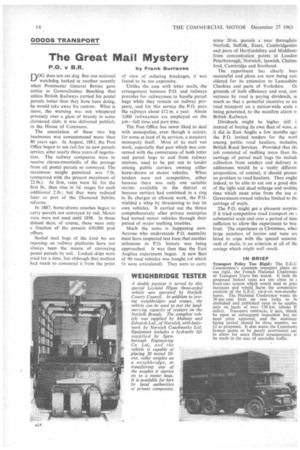The Great Mail Mystery
Page 16

If you've noticed an error in this article please click here to report it so we can fix it.
P.O. v B.R.
by Frank Burravoe
DOG does not eat dog. But one national watchdog barked at another recently when Postmaster General Bevins gave notice to Generalissimo Beeching that unless British Railways carried his postal parcels better than they have been doing, he would take away his custom. What is more, the warning was not whispered privately over a glass of brandy in some cloistered club; it was delivered publicly in the House of Commons.
The association of these two big businesses was consummated more than 80 years ago. In August, 1883, the Post Office began to use rail for its new parcels service, after nearly three years of negotiation. The railway companies were to receive eleven-twentieths of the postage from all postal parcels so conveyed. The maximum weight permitted was 7 lb. (compared with the present maximum of 22 lb.). At first, rates were 3d. for the first lb., then rose in 3d, stages for each additional 2 lb.; but they were reduced later as part of the Diamond Jubilee reforms.
In 1887, horse-drawn coaches began to carry parcels not conveyed by rail. Motor vans were not used until 1898. In those distant days, of course, there were only a fraction of the present 450,000 post offices.
Sealed mail bags of the kind We see reposing on railway platforms have not always been the means of conveying postal parcels by rail. Locked skips were tried for a time, but although that method had much to commend it from the point of view of reducing breakages, it was found to be too expensive.
Unlike the case with letter mails, the arrangement between P.O. and railways provides for railwaymen to handle parcel bags while they remain on railway property, and for this service the P.O. pays the railways about £12 m. a year. About 3,000 railwaymen are employed on the job—full time and part time.
The Post Office has never liked to deal with monopolies, even though it enjoys, for some at least of its services, a statutory monopoly itself. Most of its mail van work, especially that part which was concerned with the conveyance of both letter and parcel bags to and from railway stations, used to be put out to tender among public carriers owning either horse-drawn or motor vehicles. When tenders were not competitive, either because there was only one suitable carrier available in the district or because carriers had combined in a ring to fix charges or allocate work, the P.O. wielded a whip by threatening to buy its own vehicles. It carried out the threat comprehensively after private enterprise • had nursed motor vehicles through their period of major teething troubles.
Much the same is happening now. Anyone who understands P.O. mentality must have suspected last June that another milestone in P.O. history was being approached. It was then that the East Anglian experiment began. A new fleet of 90 road vehicles was bought (of which 31 were articulated). They were to carry some 20 m. parcels a year throughou Norfolk, Suffolk, Essex, Cambridgeshire and parts of Hertfordshire and Middlese) from concentration points at London Peterborough, Norwich, Ipswich, Chelms ford, Cambridge and Southend.
The experiment has clearly beet successful and plans are now being con sidered for its extension to Lancashire
Cheshire and parts of Yorkshire. Or grounds of both efficiency and cost, con veyance by road is paying dividends, s( much so that a powerful incentive to 11S1 road transport on a nation-wide scale i: being generated, to the manifest alarm o British Railways.
Dividends might be higher still i instead of buying its own fleet of vans, a: it did in East Anglia a few months ago the P.O. invited tenders for the wort among public road hauliers, includini British Road Services. Provided that tht job consisted of nothing more than tht carriage of parcel mail bags (to includt collection from senders and delivery tc addressees would be a vastly differen proposition, of course), it should presen no problem to road hauliers. They ought indeed, to be able to cut out a good dea of the light and dead mileage and waitini time which must arise from the use ol Government-owned vehicles limited to the carriage of mails.
The P.O. might get a pleasant surprise if it tried competitive road transport on L substantial scale and over a period of tirnt sufficient to allow the experiment to bea: fruit. The experience at Christmas, whet large numbers of lorries and vans art hired to cope with the special seasona rush of mails, is no criterion at all of tht savings which might well result.
IN BRIEF
Transport Policy Too .Rigid: The E.E.0 Commission's common transport plans an too rigid, the French National Conferenct of Transport Users has stated. It feels thr proposed forked rates are too close to t fixed-rate system which would lead to prict increases and would harm the competitivi position of the E.E.C. non-membe states. The National Conference wants au 30 per cent limit on rate forks to hi abolished and published rates to be appliet only on hauls of over 150 km. (about miles). Transport contracts, it says, shoulc be open to subsequent inspection but no need prior approval, and the minimun hiring period should be three months, no
1 it 2 as proposed. It also wants the Communy licence quota to be purely provisional ant to allow for more liberal arrangements tc be made in the case of specialist traffic.
















































































